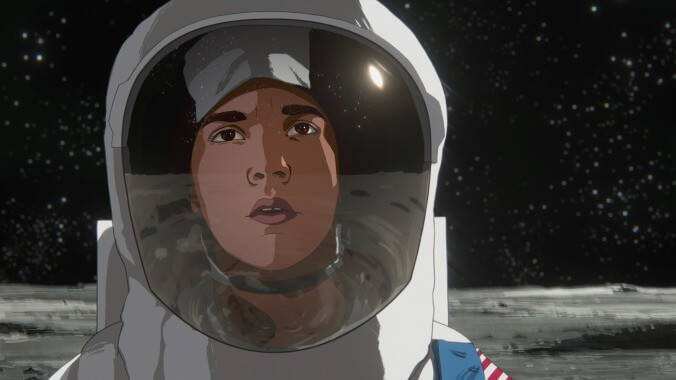In Apollo 10 1/2, Richard Linklater injects rocket fuel into childhood recollections
The director of Waking Life and A Scanner Darkly steeps his third animated outing in nostalgia and whimsy

The central premise of Apollo 10 1/2: A Space Age Childhood takes off from the launchpad of half-remembered dreams and liberties taken with factual accounts. In this spirit, it’s easy to imagine Richard Linklater meeting with the deep-pocketed Netflix, and suggest a possible origin for this movie.
“It’s an animated NASA adventure,” says the director of box office winner School Of Rock. “What if, before Apollo 11, there was a clandestine trip to the moon with a precocious pre-teen?”
But as the streamer hands him a check (in a red envelope, of course), the laid-back Texas auteur of Slacker, Waking Life, and the Before trilogy is secretly licking his chops. Because he knows to slip in enough action-adventure footage to ensure a good trailer, but in reality Linklater will deliver his version of Fellini’s Amarcord or Woody Allen’s Radio Days: an essentially plotless but engaging and enriching recollection of childhood steeped in warmth, grace, honesty, and crystalline specificity.
Undoubtedly the scenario above did not happen (nor did NASA accidentally create a too-small lunar module ahead of Armstrong, Aldrin, and Collins’ July 1969 launch), but you get a rascally “we got ‘em!” vibe five minutes into the film when Linklater slams the brakes on his space story to riff for an hour on suburban Houston in the late 1960s.
With Jack Black narrating, Apollo 10 1/2 moves with the speed of a Saturn V, reveling in the records, television shows, fashions, technology, and overheard conversations from this period of history. Stanley (Milo Coy) is a Linklater stand-in with several tweaks, like five older siblings and a father who works at NASA. Granted, Dad pushes pencils instead of launch buttons, but he’s still got a sense of pride about “beating the Russkies” on the trip to the moon.
As with Linklater’s 12-year production Boyhood, the glory is in the details, like focusing on the way kids kill time when it’s raining on a Saturday, or how to write songs for pushbutton telephones. A recurring gag has Black’s “older Stanley” acknowledging just how unsafe things seem from today’s point of view. (There’s lots of playing in traffic, fooling around with fireworks, and riding on the back of a flatbed truck.) But there’s neither a sense of scolding the past, nor grumbling that this is the way it oughta be. It’s just reporting.
As with anything this abundant in nostalgia, there’s bound to be some melancholy—indeed, the central concept of Stanley imagining himself as a lone visitor to Earth’s satellite works as a riff on untethering oneself from the cocoon-like comfort of childhood before entering adolescence—but Linklater pumps the breaks before anything can get too treacly. He acknowledges his white, middle-class, privileged milieu mostly by omission; commentators on television address the political issues of the day, with Dad rolling his eyes, older grad student sis whispering “right on,” and everyone else just remaining oblivious. Young Stan is far more interesting in babbling to his Little League pals about the ending of 2001: A Space Odyssey than anything happening down on Earth.
Lest you think this movie is just a parade of signifiers, keep in mind Linklater’s body of work. His lodestar, Slacker, is far from the goof-off its title suggests, and remains a rich seam of philosophical thought. Same with the follow-up, Waking Life, which utilizes a similar animation technique here.
Apollo 10 1/2 isn’t quite as experimental in its look as that 2001 film (or Linklater’s second foray into the medium, 2006’s A Scanner Darkly) but the movie is abundantly playful, changing “film stocks” depending on what the family is watching (or ignoring at the drive-in) or where Stan’s imagination is roaming. There’s also the treasure of terrific needle-drops, from pop hits by The Monkees, The Archies, and The Association, to psychedelic explorations by Pink Floyd, Quicksilver Messenger Service and some choice cuts rummaged from Elektra Records’ Nuggets collection.
Meanwhile, there is no universal experience of childhood, but the film includes a scene of Stan and his siblings meeting the Abominable Snowman on the Alpine Sleigh Ride at Astroworld that captures the essence of still being young enough to get lost in imagination. For kids at Stan’s age, they don’t know it also might be the last time, but the way Linklater captures the exhilarating free fall of that moment should make every grown up smile.